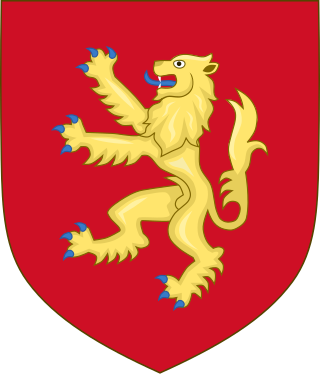Related Research Articles

Richard Fitzalan, 4th Earl of Arundel, 9th Earl of Surrey, KG was an English medieval nobleman and military commander.

The Lords Appellant were a group of nobles in the reign of King Richard II, who, in 1388, sought to impeach some five of the King's favourites in order to restrain what was seen as tyrannical and capricious rule. The word appellant — still used in modern English by attorneys — simply means '[one who is] appealing'. It is the older (Norman) French form of the present participle of the verb appeler, the equivalent of the English 'to appeal'. The group was called the Lords Appellant because its members invoked a procedure under law to start prosecution of the King's unpopular favourites known as 'an appeal': the favourites were charged in a document called an "appeal of treason", a device borrowed from civil law which led to some procedural complications.

Newcastle-under-Lyme is a constituency in northern Staffordshire created in 1354 and represented in the House of Commons of the UK Parliament since 2019 by Aaron Bell of the Conservative Party. It was the last to be co-represented by a member of the Conservative Party when it was dual-member, before the 1885 general election which followed the Redistribution of Seats Act 1885 coupled with the Reform Act 1884. In 1919 the local MP, Josiah Wedgwood, shifted his allegiance from the Liberal Party — the Lloyd George Coalition Liberals allying with the Conservatives — to the Labour Party and the seat elected the Labour candidate who has stood at each election for the next hundred years, a total of 29 elections in succession. Labour came close to losing the seat in 1969, 1986, 2015 and 2017, and eventually lost the seat in 2019.

The Merciless Parliament was an English parliamentary session lasting from 3 February to 4 June 1388, at which many members of King Richard II's court were convicted of treason. The session was preceded by a period in which Richard's power was revoked and the kingdom placed under the regency of the Lords Appellant. Richard had launched an abortive military attempt to overthrow the Lords Appellant and negotiate peace with the kingdom of France so he could focus all his resources against his domestic enemies. The Lords Appellant counteracted the attempt and called the parliamentary session to expose his attempts to make peace. Parliament reacted with hostility and convicted almost all of Richard's advisers of treason. Most were executed and a few exiled. Parliament was dissolved after violence broke out in Kent and the Duke of York and his allies began objecting to some executions. The term "merciless" was coined by Augustinian chronicler Henry Knighton.

Sir Thomas de Hungerford of Farleigh Castle in Somerset, was the first person to be recorded in the rolls of the Parliament of England as holding the office of Speaker of the House of Commons of England, although that office had existed before his tenure.
Sir Richard Waldegrave was an English knight and Member of Parliament, who served as Speaker of the House of Commons from November 1381 to February 1382.
Events from the 1380s in England.
Events from the 1420s in England.
Sir Nicholas Brembre was a wealthy magnate and a chief ally of King Richard II in 14th-century England. He was Lord Mayor of London in 1377, and again from 1384–5,6. Named a "worthie and puissant man of the city" by Richard Grafton, he became a citizen and grocer of London, and in 1372-3 purchased from the Malmains family the estates of Mereworth, Maplescomb, and West Peckham, in Kent. His ties to Richard ultimately resulted in his downfall, as the anti-Richard Lords Appellant effectively took control of the government and imprisoned, exiled, or executed most of Richard's court. Despite Richard's efforts, Brembre was executed in 1388 for treason at the behest of the Lords Appellant.

Thomas Montagu, 4th Earl of Salisbury, KG of Bisham in Berkshire, was an English nobleman and one of the most important English commanders during the Hundred Years' War.
Thomas Ballard (1630–1689) was a colonial Virginia landowner and politician.
Thomas Waltham, of Kingston upon Hull, Yorkshire, was an English politician.
Thomas Gay was an English merchant and Member of Parliament. Little is recorded of him.
Thomas Chippenham, of Hereford (fl. 1388–1402), was an English politician.
Thomas Cuttyng, of Wilton, Wiltshire, was an English Member of Parliament.
Thomas Cammell, of Shaftesbury, Dorset, was an English Member of Parliament.
Thomas Seward, of Shaftesbury, Dorset, was an English Member of Parliament and merchant.
Thomas Baret, was an English Member of Parliament and spicer.